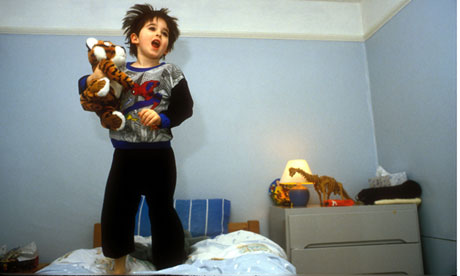
Suzanne Morgan, headteacher of a primary school in Sussex, has written an open letter to parents, urging them to put their children to bed earlier.
"Obviously," Morgan wrote, "we can only talk to children about good habits and about the need for a definitive amount of sleep at their age." Perhaps you don't know what that means. I confess that I don't know whether she means "definitive" just as a catchall word for "listen here, you guys, this time I really am serious" – or whether she is underlining the fact that all age-groups, pre-adulthood, need a fixed amount of sleep upon which the paediatric community is agreed. The Margaret Thatcher model, where a person inexplicably needs only four hours a night? That child does not exist. If we're honest, the adult doesn't really exist either – it was probably because she was sleep-deprived that Thatcher was such a sociopath.
And those commonly acccepted age/hour requirements in full:
One to two years old: 14 hours a day
This will probably take the form of a two-hour snooze after lunch, then a 12-hour main sleep from 7pm to 7am; babies and small toddlers match their sleep to something like the hours of the clientele of a gentleman's club. Parents of this age group will need little encouragement to get them to bed on time; they've probably already got a corkscrew in one hand on their way up the stairs.
Three to six years old: 12 hours a day
This is the same as the pre-verbal group, except they have dropped their nap. If, as a parent, you are encountering any difficulty knowing that it's bedtime, you can tell they're tired when they start punching you in the face and screaming: "I'm not tired."
Seven to 12 years old: 10 to 11 hours a day
Even if you decide not to adapt your schedule to your children's new needs, they will outwit you with their handheld tablets and their relentless CGI bloodlust. Before you freak out too much about Morgan's warnings that she frequently witnesses pupils acting out Call of Duty in the playground, you may like to bear in mind that when we were kids, we used to read under the duvet with a torch, and often "act out" scenes from books in which people were stabbed or decapitated. For God's sake.
12 to 18 years old: eight to nine hours a day
It is strange to discover that adolescents need less sleep than younger children, since this is the zombie-phase, when they can only be roused with a hose, and parents across the land are reduced to doing pretend-DIY just to find new and outrageous ways to make a noise. The only explanation is that, like cats, they are up all night, prowling round gardens, looking in bins. Try not to worry. Your cat's OK.
So, do you follow these guidelines at home? And how do you manage to get your kids to bed on time?

